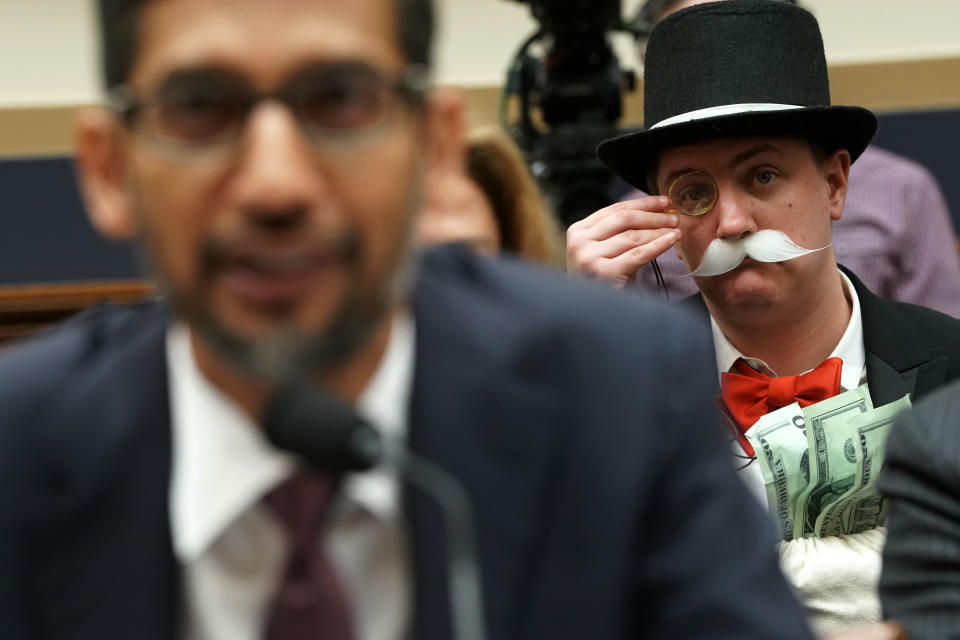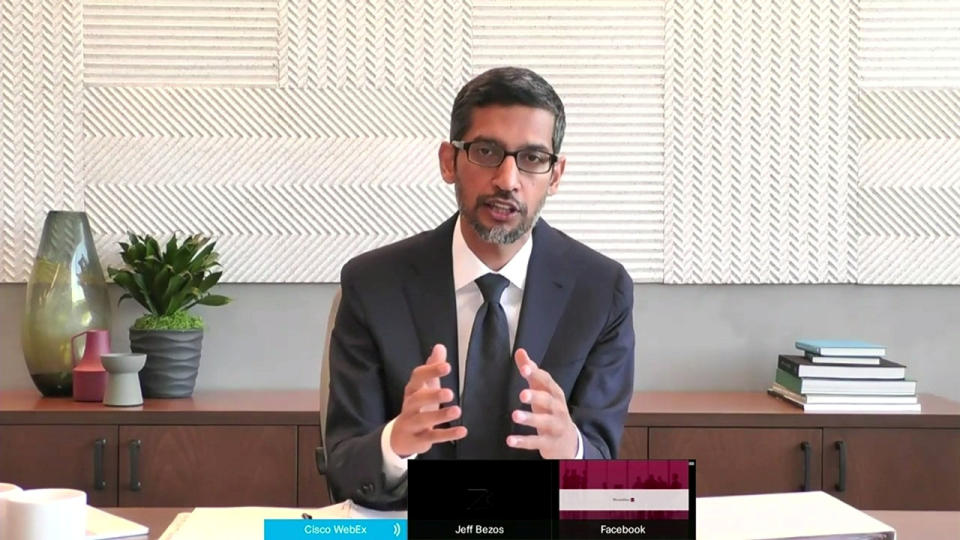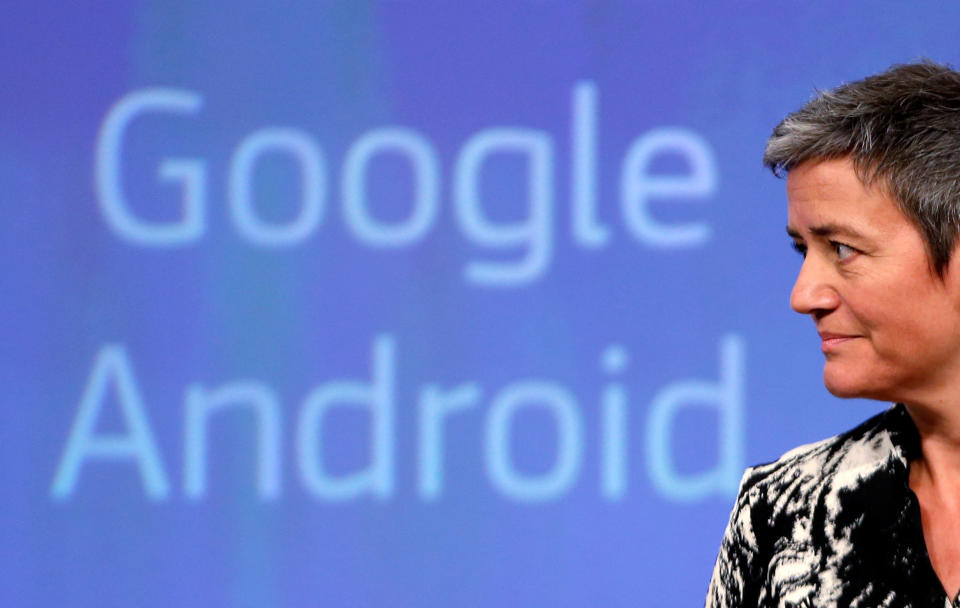The Justice Department's fight against Google doesn't spell the end of Big Tech
Wednesday, October 21, 2020
This article was first featured in Yahoo Finance Tech, a weekly newsletter highlighting our original content on the industry. Get it sent directly to your inbox every Wednesday by 4 p.m. ET. Subscribe
Google's antitrust battle won't stop Big Tech
The first domino has fallen. On Tuesday, Google parent Alphabet (GOOG, GOOGL) was officially hit with an antitrust lawsuit by the Department of Justice (DOJ) and a coalition of 11 state attorneys general claiming the tech titan operates as an illegal monopoly.
The Justice Department's lawsuit is just the beginning of what is expected to be a years-long legal saga that could transform the world's preeminent internet search company.
Google is just the first in line. Amazon (AMZN), Facebook (FB), and Apple (AAPL) are all under intense scrutiny from the federal government, state attorneys general, and Congress, as well. But if you think this spells the end of Big Tech, I’d argue that you’re wrong.

Need proof? Look not further than a major tech company not under the government's gaze right now — Microsoft. The Justice Department targeted Microsoft for years, starting in the 1990s, before reaching a settlement in 2001 that was hailed by some as a victory for the tech giant.
Microsoft is now one of the world’s most powerful tech companies.
Google has been preparing for this
Google has known that a lawsuit was likely coming for some time already. The company has been in contact with the DOJ, as well as state attorneys general, and members of Congress, so it's not as though Tuesday's lawsuit came as a massive shock to the firm.
In their suit, the DOJ and state attorneys general claim that Google has, among other things, entered into arrangements that force the pre-installation of its apps in "prime locations on mobile devices and make them undeletable, regardless of customer preference." This relates to the Google apps on your Android phone.
Sign up for Yahoo Finance Tech newsletter
The firm is also accused of "Entering into long-term agreements with Apple that require Google to be the default — and de facto exclusive — general search engine on Apple's popular Safari browser, and other Apple search tools," according to a DOJ release about the suit.
The DOJ maintains that Google would use the profits from these practices to buy "preferential treatment for its search engine on devices, web browsers, and other search access points, creating a continuous and self-reinforcing cycle of monopolization."
Have you ever wondered why your iPhone relies on Google search even though Apple and Google are constantly competing for smartphone market share around the world? Well, now you know it's because Google pays big bucks for it. (Apple's real-time stock prices in its Stocks apps, it's worth mentioning, are provided by Yahoo Finance.)
Despite the fact that the lawsuit was filed Tuesday, Google has been preparing to defend itself since the government began looking into any potential antitrust violations. And that's important because proving an antitrust case can be incredibly difficult, according to legal experts.
The DOJ has its work cut out for it
The U.S., unlike the European Union, is relatively lax when it comes to taking on potentially monopolistic behavior, according to NYU Law School professor Eleanor Fox.

"I also know, as they do, that the law is very conservative and that means that there is a general assumption that firms...should be given the freedom to do a lot of what they want," Fox told Yahoo Finance.
Moreover, Google is likely incredibly well prepared to defend itself. The company could also be aided by the fact that the tech giant is transparent about its allegedly anti-competitive behavior, Cornell University Senior Professor of Law and Professor of Economics George Hay told Yahoo Finance's “The Ticker” on Monday.
“This is not like price fixing, which is done in secret on the chance you get away with it. Everything Google does is public. There's not a single thing they do which isn't vetted by their lawyers and economists,” he said. “...They pretty clearly think they have an argument that they've done nothing unlawful.”
Microsoft was down and out, but came roaring back
According to Joel Mitnick, a former FTC trial lawyer and partner with Cadwalader's Antitrust Group, the closest analogy to the Google suit is the DOJ's 1998 suit against Microsoft, which claimed it used its control over its software business to thwart competition.
"That case should also somewhat be a cautionary tale for the government, because while it is easy to file a case in federal court, it is very difficult to actually win one of these cases and then sustain it," Mitnick explained.
After first being ordered to break up and then winning an appeal that allowed it to remain whole, Microsoft agreed to a settlement that required it to share its application program interface with third parties.
But it was still largely allowed to bundle its own software with its operating system, which was part of the issue behind the original suit. It was a win for Microsoft, but it still took the company years to recover from the strain the case put on the organization.

While the company was defending itself against accusations that it attempted to crush rivals like Netscape, it missed the boat on some of the biggest innovations of the 2000s, namely mobile tech and social networking.
True, Microsoft entered into the smartphone market with its own mobile operating system, but it was already behind the likes of Apple and Google, which were dominating the space with the iPhone and Android devices. Facebook, meanwhile, began its ascent as a social media platform in 2004, eventually growing into the powerhouse it is today.
As Hay explained, while Microsoft may not have been broken up, the trial and its impact on the company, in effect, served as the remedy.
If Microsoft hadn’t been contending with its antitrust issues, it very well may have been able to enter both the mobile and social media markets with ease. But it didn't, and as a result we got innovative new companies like Google and Facebook and a completely reinvented Apple.
Despite that, Microsoft's sheer size allowed it to pivot, pushing into markets as diverse as gaming and cloud computing. And it's paid off. Microsoft is now worth more than $1.5 trillion, and shows little sign of slowing.
Google, likewise, is already a massive firm and has its hands in a slew of disparate businesses whether that's the still-nascent self-driving car industry or its own growing cloud computing business. So while it may take a beating as a result of the DOJ's suit, there's little chance the search giant is staring down its own self-inflicted demise.
"I wouldn't expect a breakup...it's not what courts usually do," Fox said. "And I do not think that spells the end of big tech at all."
By Daniel Howley, tech editor. Follow him at @DanielHowley
More Tech News
Netflix earnings: Shares tumble after subscriber additions, guidance miss estimates
Senator Ted Cruz: Big tech companies like Google are 'drunk on power'
Robinhood doesn’t require security step that’s standard on most competing online brokerages
Tech Support
How to upgrade to the iPhone 12
—
Read the latest financial and business news from Yahoo Finance
Follow Yahoo Finance on Twitter, Facebook, Instagram, Flipboard, LinkedIn,YouTube, and reddit.

